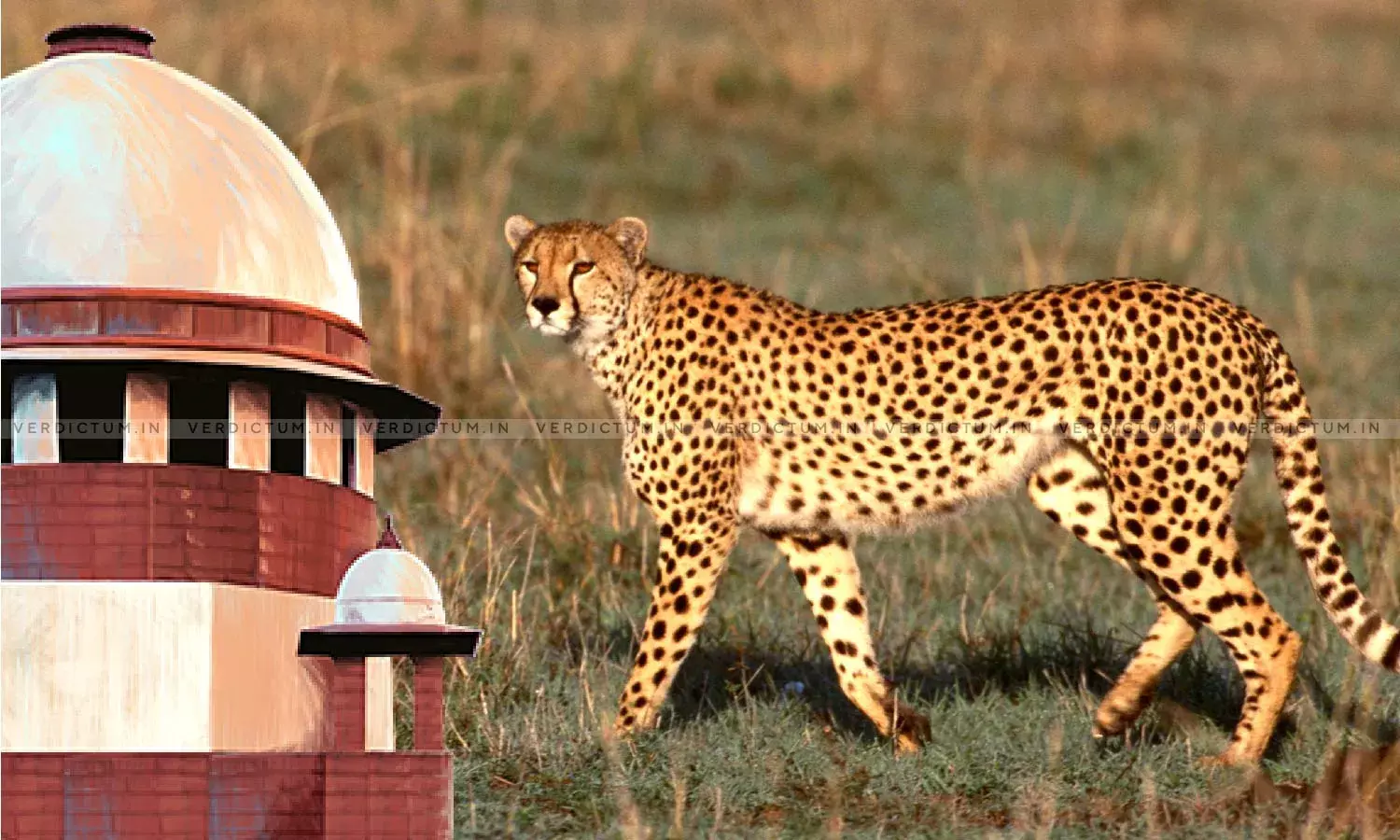No Reason To Disbelieve Centre On Measures Being Taken To Curb Cheetah Deaths: Supreme Court
The Supreme Court today, disposed of an intervention application by the Centre for Environment Law WWF, raising concerns over the death of adult Cheetahs out of the 20 translocated Cheetahs from South Africa and Namibia, at the Kuno National Park (KNP) in Madhya Pradesh. The Court, considering the Centre’s statements in the affidavit providing for the measures that have already been taken for the project, remarked that there was "no reason to disbelief the statements".
The Bench of Justice B.R. Gavai, Justice P.S. Narasimha and Justice Prashant Kumar Mishra also stated that the issue is best left to the experts in the field and the decision to nominate any person in the committees lies exclusively with the Centre.
The Union of India, in the affidavit that was placed on record, submitted:
- that out of the 20 Cheetahs, 14 are surviving and 6 are dead;
- that the newspapers gave an incorrect figure reporting additional deaths, as the 4 deaths shown are actually of the 3 cubs where one has actually survived and has turned 5 months old and is healthy;
-an expert committee consisting of 11 experts in the field of wildlife has been already constituted, being steered by National Tiger Conservation Authority (NTCA);
-an international committee of Cheetah experts consisting of 4 experts is also constituted;
- efforts are being made on a daily basis to take positive steps towards the success of this ambitious cheetah translocation project and every effort is being made by the Union of India to preserve cheetahs in India.
Noting the same, the Bench observed, “We see no reason to disbelief statements made on affidavit. In any case, the area is an area which is best left to the expert in the field. We don’t possess any expertise in that field. As to whether a particular person needs to be nominated in the said committee or not, is a matter which is exclusively within the domain of the Union and we do not wish to thrust any member on the said committees. In the affidavit, it is further stated that the concerns expressed by the present applicant are also taken into consideration and are sought to be addressed. If the applicant has any further suggestion, same can be given to the Union of India which we request to be taken into consideration in the right earnest. With these observations, the IA stands disposed of”.
ASG Aishwarya Bhati appeared for the Union of India, Senior Advocate Prashanto Chandra Sen appeared for the IA applicant and Addl. Standing Counsel Siddharth Sangal appeared for the State of Uttarakhand.
At the outset, Bhati submitted before the Court that the Centre is really looking into the matter and is putting in its best efforts to prevent the rising death toll. It was further put forth that the Cheetahs have been found to be adapting in the environment. It was also stipulated that as it is the first intercontinental Cheetah translocation, therefore, because of the climatic changes, certain survival challenges are not alarming.
Moreover, it was also contended there has been no human conflict found or witnessed in the present scenarios, which is an achievement in itself. Also, while citing mothers leaving their cubs in certain situations as an example, less human intervention was suggested, as it could reverse the objectives sought to be achieved by the project.
"Despite being a novel and a challenging project, overall indications are encouraging. There are some problems but nothing is alarming", Bhati submitted.
It was further submitted that the temperature difference between India and South Africa, and their tendency to develop a winter coat during winters acted counterproductive, as they developed it in the peak heat and humidity, which lead to some infections resulting in death, while some died due to dehydration.
However, on that Justice Narsimha categorically said, “The point is, has it been thought about that once the translocation takes place they would have thought about the fact that during the summer, the situation here is not the same as in Namibia. So if that were the situation, what were the steps to be taken in the advent of the summer and this was perhaps expected…what you have done after the death sending the viscera and all that is a consequence, we are talking about something else…”.
“The sum and substance of what you are saying is everything is well. All is well”, he remarked further.
Agreeing on the aspects and measures that Bhati stipulated in her submissions, and the provision of 'Cheetah Mitra' in existence, Sen, however, contended that the Namibia expert was not consulted at all in the matter. Furthermore, the reason for dismissing the Mukundra Wildlife in Rajasthan as an option, was also not valid, as cattle don't attack Cheetahs.
“Where will we get the Veterinary experts in Cheetahs In India, when there is no Cheetah in India?”, Justice Gavai asked.
For the background, on March 28, a day after the first death of cheetah at Kuno, the Supreme Court had sought details of experts in the Cheetah Task Force such as their qualifications and experience.
The Centre had said in its application that according to the action plan for cheetah introduction in India, annually 8-14 big cats are required to be brought in from African countries at least for the next five years, and a memorandum of understanding to that effect has been signed by the government of India with Namibia and South Africa.
Cause Title: Centre For Environment Law WWF v Union Of India Ministry Of Environment, Forest And Climate Change And Ors.



